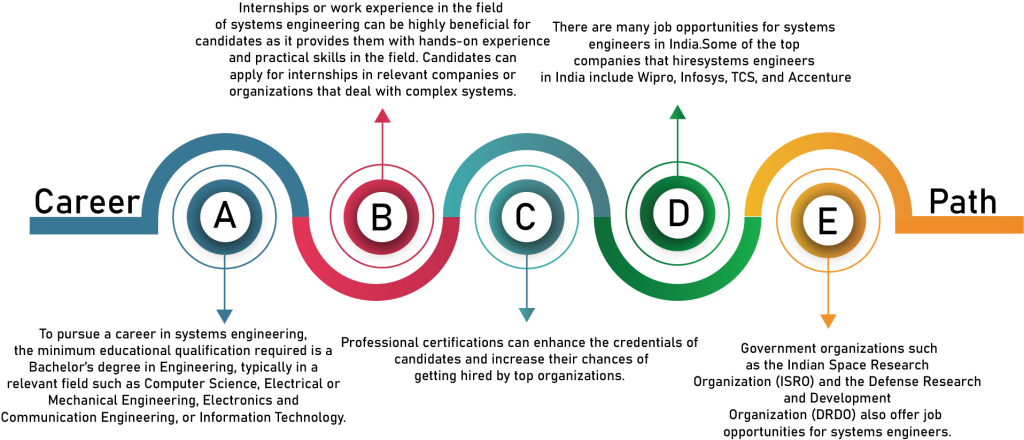Systems engineering is a multidisciplinary approach to designing, analyzing, and managing complex
systems over their entire lifecycle. It involves integrating various subsystems and components into a
coherent and functional system that meets specific requirements and objectives. Systems engineering
draws on principles from fields such as engineering, mathematics, and management to ensure that the
system is efficient, reliable, safe, and cost-effective. It also involves considering the social, economic,
and environmental impacts of the system.

Work description
The work description of systems engineering can vary depending on the specific industry, organization,
and project.
Systems engineers gather and analyze customer requirements to understand the system's purpose,
functionality, and performance requirements. They identify and document system requirements and
specifications.
Systems engineers design and develop system architecture and subsystems to meet the requirements.
They consider various factors such as system interfaces, compatibility, maintainability, and reliability.
Systems engineers integrate subsystems into the overall system and ensure that they work together
seamlessly. They also develop and perform testing procedures to verify that the system meets the
requirements.
Systems engineers identify and analyze potential risks associated with the system, and develop
strategies to mitigate them. They also develop contingency plans in case of system failures.
Systems engineers lead and manage projects, ensuring that they are completed on time, within budget,
and to the required quality standards.
Systems engineers work closely with various stakeholders, including customers, project managers,
software developers, and hardware engineers. They communicate technical information clearly and
effectively to ensure that everyone understands the system requirements and specifications.
High Demand
High demand: Systems engineering is a growing field with a high demand for skilled
professionals across various industries, including aerospace, defense, automotive, and
healthcare.
Lucrative salaries
Diverse career paths: Systems engineering offers a diverse range of career paths, from design
and development to project management and leadership roles.
Opportunities for innovation
Challenging work: Systems engineering involves working on complex and challenging projects,
which can be intellectually stimulating and rewarding.
Versatility
Continuous learning: Systems engineering requires ongoing learning and development, which
can help professionals stay up-to-date with the latest technologies and industry trends.
Flexibility
Team-oriented work: Systems engineers work collaboratively with other professionals, which
can foster a supportive and engaging work environment.
Job satisfaction
Many computer engineers find the work challenging and rewarding, as they have the opportunity to solve complex problems and make a significant impact in their field.
High stress
High pressure: Systems engineering can involve working on high-stakes projects with strict
deadlines and rigorous quality standards, which can be stressful and demanding.
Long hours
Technical complexity: Systems engineering requires a deep understanding of technical concepts
and systems, which can be challenging for some professionals.
Competitive field
Long hours: Systems engineering projects can require long hours and overtime, particularly
during the testing and integration phases.
Constant learning
Limited creativity: Systems engineering involves designing and developing systems based on
specific requirements and specifications, which can limit creativity and innovation.
Isolation
Regulatory compliance: Systems engineering projects in regulated industries such as healthcare
or aerospace must comply with strict regulatory requirements, which can add complexity and
constraints to the work.
Eye strain and other physical health issues
Staring at computer screens for long periods of time can cause eye strain and other physical health issues, such as back pain and repetitive strain injuries.
The cost for pursuing a career in systems engineering in India can vary depending on various factors
such as the type of institution, the degree program, and the duration of the course.
The total cost of a 4-year Bachelor's degree program in systems engineering can range from INR 3 lakhs
to INR 10 lakhs (approximately USD 4,000 to USD 13,500) depending on the institution.
The total cost of a 2-year Master's degree program in systems engineering can range from INR 2 lakhs to
INR 10 lakhs (approximately USD 2,700 to USD 13,500) depending on the institution.
Some systems engineering professionals may choose to pursue additional certifications or training
programs to enhance their skills and knowledge. The cost of these programs can range from a few
thousand to several lakhs of rupees.
Moreover, the investment may also include additional expenses such as accommodation,
transportation, textbooks, and other study materials.
[wpcharts type=”horizontalbarchart” bgcolor=”red:gray:yellow,blue:gray:yellow,random:gray:yellow,purple:gray:yellow” min=”0″ legend=”true” titles=”2 year , 5 year” values=”3,7,5,12″]
The earning potential of systems engineering in India can vary depending on factors such as experience,
industry, location, and job role.
The starting salary for an entry-level systems engineer in India can range from INR 3 lakhs to INR 8 lakhs
per year.
The salary for a senior systems engineer with 5-10 years of experience in India can range from INR 8
lakhs to INR 20 lakhs per year.
And, the salary for a systems engineering manager with 10+ years of experience in India can range from
INR 20 lakhs to INR 40 lakhs per year.
It's important to note that these are estimated salary ranges and actual salaries may vary depending on
various factors such as industry, location, and company. Additionally, systems engineering professionals
with additional certifications and specialized skills may be able to earn higher salaries.
[wpcharts type=”horizontalbarchart” bgcolor=”red:gray:yellow,blue:gray:yellow,random:gray:yellow,purple:gray:yellow” min=”0″ legend=”false” titles=”Entry-Level, Mid-Career, Senior-Level ” values=”5,15,25,35,45,55″]
Strong analytical skills.
Excellent problem-solving abilities.
Attention to detail.
Good communication skills.
Ability to work well in a team.
Aptitude for mathematics and science.
Critical thinking skills.
Lack of attention to detail..
Inability to think critically and solve complex problems.
Poor communication skills.
Resistance to working in a team environment.
Lack of interest in math and science.
Inability to adapt to changing project requirements and timelines.
Not having a solid understanding of engineering principles and practices.
Work-life balance
As a systems engineer, the work-life balance can vary depending on the specific job and the company
culture. However, in general, systems engineers are expected to work full-time and may need to work
additional hours to meet project deadlines. Systems engineering is often project-based work, which
means there may be times when a system engineer needs to work longer hours or weekends to meet
deadlines. This can lead to some disruption in the work-life balance.
A systems engineer may also be required to travel to project sites or attend meetings with clients or
team members, which can add to their workload and time commitments.
However, many companies recognize the importance of maintaining a healthy work-life balance for their
employees, and they may offer flexible work arrangements such as telecommuting or flexible hours.
Additionally, some companies may offer benefits such as paid time off, sick leave, and employee
assistance programs to support their employees' mental and physical well-being.
In order to maintain a healthy work-life balance as a systems engineer, it is important to prioritize time
management, set realistic expectations, communicate clearly with team members and managers, and
take breaks when necessary to avoid burnout.

Opportunity to work on complex and cutting-edge projects across a variety of industries,
including aerospace, defense, healthcare, and transportation.
Potential for high job security and competitive salaries, as systems engineers are in demand and
typically well-compensated.
Possibility for career advancement, with opportunities to become a senior systems engineer,
project manager, or even a company executive.
Ability to make a meaningful impact on society by designing and developing systems that
improve people's lives, such as medical devices, transportation systems, and communication
networks.
Chance to work with interdisciplinary teams and collaborate with professionals in fields such as
software engineering, electrical engineering, and mechanical engineering.
Opportunity to develop valuable skills, such as critical thinking, problem-solving, and project
management, which are transferable to a variety of career paths.
Artificial Intelligence Machine Learning
Aerospace systems engineering: Focuses on designing, developing, and testing systems used in
aviation, space exploration, and defense.
Cyber security
Control systems engineering: Involves designing and implementing control systems to regulate
and monitor complex processes and machinery in industries such as manufacturing, energy, and
transportation.
Software Engineering
Medical systems engineering: Involves designing and developing medical devices and systems,
such as imaging systems, prosthetics, and drug delivery systems.
Data Science Machine Learning
Information systems engineering: Focuses on developing and implementing systems and
software for managing and processing data in organizations and industries such as finance,
healthcare, and education.
Computer Networks
Environmental systems engineering: Involves designing and implementing systems and
technologies to address environmental issues such as pollution, climate change, and resource
management.
Conclusion:
In conclusion, pursuing a career in systems engineering can offer a rewarding and challenging path with
the opportunity to work on complex and cutting-edge projects across a variety of industries. With strong
analytical and problem-solving skills, attention to detail, and a passion for innovation, systems
engineering professionals can make a meaningful impact on society while enjoying job security,
competitive salaries, and opportunities for growth and advancement.



